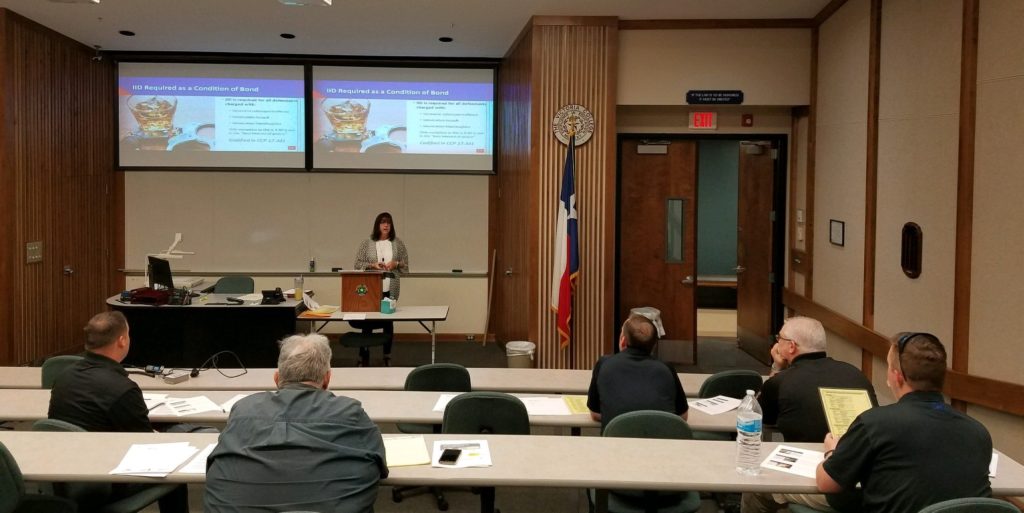Ignition Interlock Matters
 Ignition interlock devices (IIDs) are specifically designed to detect breath alcohol concentration (BrAC) and prevent the driver from starting the motor vehicle if the BrAC exceeds the identified threshold. In Texas, offenders may be ordered to have an interlock installed on their car as a condition of bond or probation.
Ignition interlock devices (IIDs) are specifically designed to detect breath alcohol concentration (BrAC) and prevent the driver from starting the motor vehicle if the BrAC exceeds the identified threshold. In Texas, offenders may be ordered to have an interlock installed on their car as a condition of bond or probation.
The National Highway Safety Administration (NHTSA) recognizes the importance of continued interlock training for criminal justice professionals to stay current with legislative changes in the field. The Texas 86th Regular Legislative Session has implemented news laws that directly affect the application of IIDs. To fulfill the State’s needs, the Texas Department of Transportation has awarded a 402 grant to the Texas A&M Transportation Institute (TTI) to provide updated ignition interlock training and evaluation to members of the criminal justice system.
TTI Offers Free Training
The Ignition Interlock Training Program is a four-hour training designed to increase judges, probation officers, and the prosecutor’s knowledge and skills related to ignition interlock. Classes are tailored towards each profession, and topics discussed pertain to the job duties of the specific group being instructed.
Sponsored by TxDOT, TTI created the curriculum in 2016 and, since then, has been providing FREE training to criminal justice professionals in matters regarding current interlock laws, compliance, and reporting. The training allows participants to earn CONTINUING EDUCATION credit to its participants and is tailored to each specific group.
The curriculum used during the training is updated each year based on legislative changes and participant feedback.
Please see the information below for training location options and registration! Training opportunities are added throughout the year, so please check back or contact the training coordinator for more information.
Topics Covered
Training participants will learn about:
- Texas Ignition Interlock Device (IID) Laws
- Current Impaired Driving Trends and Usage
- Implementation of IID Programs and Strategies
- Technology and Violations
- IID Challenges and Concerns
- IID Reporting
2025 Training Opportunities
The Ignition Interlock Training Program will offer training opportunities in several locations in 2025. Dates and times will be added in the links below as they are finalized.
Training Coordinator
For more information about the training, contact Crystal O’Rear at [email protected].
Training Accomplishments
- In 2024, TTI received 374 participant registrations. TTI instructed 332 people. All participants successfully completed the course. The participants represented 24 counties in Texas.
- In 2024, Participants in the IITCJP experienced an average of 38.37 percent knowledge gain based on pre-test and post-test assessments.
Participant Evaluation Ratings
TTI has shown to be of great value to its participants.
- 4.9 / 5 Instructor Rating in 2024.
- 4.8 / 5 Course Content and Format Rating in 2024.
FAQ
- Is this training going to cost me anything?
No! The course is sponsored by the Texas Department of Transportation, so there is no cost to you or your agency. - Do I get continuing education credit?
Prosecutors and judges are eligible for state bar credit and/or Judicial Education Credit through the Texas Association of Counties (TAC). Certificates of completion are also available upon request. - Do I need to pre-register for this training?
Yes, please pre-register to ensure your spot. Otherwise, you will not receive the webinar link. - Can a co-worker of mine participate?
We encourage anyone that will be helped by this curriculum to attend. This includes clerks and other administrative staff. - What do I need to bring in the day of the training?
Just yourself and a pen. We will e-mail the materials to you. Please feel free to print what you want. - What do I need to do to get the continuing education credit?
TAC and state bar credit are completed upon completion of the course. If you do not see it on your account within two weeks, please contact the training coordinator. - How do I get this training in my area?
Typically, training locations are chosen several months to a year ahead of time. If you would like us to host a training in your area, please contact the training coordinator, and we would be happy to work with you! Training coordinator: Crystal O’Rear, [email protected]

